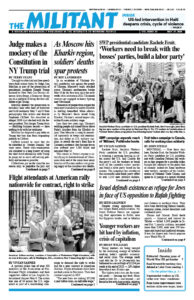In an escalation of Vladimir Putin’s murderous war against the people of Ukraine, Moscow’s tanks attacked across Ukraine’s northeastern border May 10 for the first time since the early weeks of its invasion in 2022. Ukrainian reserves are engaged in heavy fighting near Vovchansk.
Thousands of people from around the town were evacuated to nearby Kharkiv as shelling intensified. More advances by Moscow’s forces would bring Kharkiv, Ukraine’s second-largest city, within Russian artillery range.
Less than two years ago, Ukraine’s working people and armed forces drove Putin’s invaders from the Kharkiv region. Now Moscow is using its numerical superiority in troops and ammunition, and delays in U.S. military supplies, to stretch the war’s front line to Ukraine’s northeast. But Russian forces also suffered over 1,300 killed and wounded May 10.
This comes as Putin’s regime is intensifying its bombardment of Ukrainian cities and at the same time many families of Russian soldiers are growing angry at the countless war deaths. More demoralized Russian soldiers are deserting.
The Putin regime sacrifices wave after wave of Russian soldiers in its assaults on Ukrainian positions. In April, 24,550 Russian soldiers were either killed or wounded to gain 33 square miles of Ukrainian territory in the southern Donetsk region. The rate of over 1,000 Russian casualties a day that month is almost double that of the past two years.
The Kremlin keeps the scale of losses a state secret. It also hides the fate of missing servicemen from their angry mothers and wives. A year ago Moscow turned down an offer by the Ukrainian government to repatriate the remains of 3,000 soldiers. Without bodies to prove their deaths, no compensation needs to be paid to families.
Groups of missing soldiers’ relatives and friends in the tens of thousands have sprouted up on Russian online platforms to share information and demand answers.
At annual celebrations marking the end of World War II on May 9, descendants of Red Army veterans usually march with portraits of fathers and grandfathers who died in that war. In several cities around the country the Kremlin canceled these parades, fearing that women and children would swamp the marches with pictures of husbands and fathers killed in its Ukraine war.
At a World War II memorial park in Moscow, soldiers’ wives and mothers organized by the group The Way Home boldly laid flowers and protested the deployment of their loved ones in Ukraine.
“Did our ancestors truly sacrifice their lives so that we would be drawn into this war,” the group said on its website. “Today is a day of sorrow for us and not a parade with fanfare.”
Growth of Russian desertions
Demoralization is growing among untrained and ill-equipped Russian soldiers.
Get Lost is a group of Russians living in Georgia who aid Russian soldiers trying to desert. It says it was contacted by some 500 soldiers in the first two months of this year. More than 7,300 of Moscow’s soldiers have faced trial in Russia for desertion since September 2022.
A deserting Russian soldier recently helped extract two wounded Ukrainian paratroopers who were stuck behind enemy lines in the Luhansk region, which is occupied by Moscow. They had been hidden by Ukrainian civilians there for more than a year while receiving medical treatment.
The Russian soldier, Dmytro, had applied to the Ukrainian government’s I Want to Live project, seeking to defect. More than 220 Russian soldiers surrendered last year by using the hotline.
Dmytro hijacked a car Sept. 28 and the three drove through 18 Russian checkpoints, disguised in army uniforms. The Ukrainian paratroopers are now back on duty. Dmytro is now a pro-Ukraine fighter with the Freedom of Russia Legion.
This militia is one of the Ukraine-based Russian units that jointly staged cross-border raids into Russian territory in the Kursk and Belgorod regions in mid-March. With tanks, armored vehicles and drones, they battled Russian forces for over a week.
Another of the pro-Ukraine exile groups is the Siberian Battalion, which draws fighters from the Russian Federation’s ethnic minorities. These form a disproportionately large part of Moscow’s troops dying in the war.
Developments like this help to show that working people in Russia are the most important potential allies of working people in Ukraine.


![“Solo protest” in Moscow Jan. 6, says, “Freedom for mobilized. Bring back husbands, fathers, sons!” The Way Home group, families of Russian conscripts, denounced Putin’s May 9 rally, “Did our ancestors truly sacrifice their lives so we would be drawn into this [Ukraine] war?”](https://themilitant.com/wp-content/uploads/2024/05/Moscow-Protest-8821.jpg)